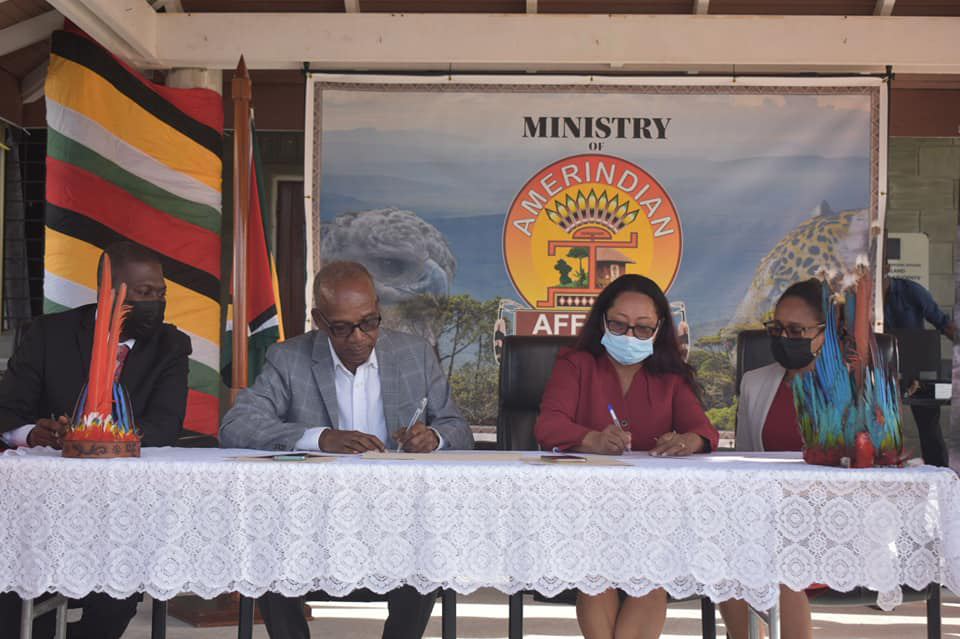The Ministry of Amerindian Affairs and the Ministry of Labour on Thursday signed a Memorandum of Agreement for a project to train hinterland youths.
During the signing ceremony, held at the Hinterland Scholarship Dormitory, at Liliendaal, East Coast Demerara, Minister of Amerindian Affairs Pauline Sukhai and Minister of Labour Joseph Hamilton both stated that they were happy to embark on the project, which is being funded through the Ministry of Amerindian Affairs’ budgetary allocation. The six-month project carries a price tag of $35.7 million, with $39.2 million being the overall amount allocated for the project and other expenses.
According to the Chief Executive Officer of the Board of Industrial Training (BIT) Richard Maughn, the project will see 440 individuals from hinterland communities receiving training in field operation, tractor maintenance, and introduction to solar installation and maintenance, over six-weeks. The youths will be trained in batches by BIT officers.
Notably, the training was launched on World Youth Skills Day. This year’s theme was “Reimagining Youth Skills Post Pandemic”. Maughn noted that the focus this year is on how technical vocation education and training systems have adapted to the pandemic. He added that the launch serves to communicate that these bodies are adapting excellently to the pandemic as it relates to youth training in the country.
Maughn went on to say that the training will allow for sustainable development and creation of jobs for young people within Guyana while noting the need for local human resources to support initiatives in communities and to ensure that goals are met. Hence this training allows for Community Support Officers to not only benefit but also those employed in other sectors within communities. “BIT is forever seeking opportunity to fulfill the mandate to respond to the technical and manpower needs of our society by ensuring need for occupational competencies are attained.”
BIT, he said, has embarked on many skills training projects in Amerindian communities but none of this type and magnitude. He explained that the project is being implemented in order to provide high level training within a range of technical competency areas as “such skills training is necessary to enable the beneficiaries to provide service needed within their community and to improve their living, their social and economic condition for themselves and for their families.”
The CEO encouraged the participants to be diligent and acquire as much as they can in order to return to their communities adequately-equipped to apply skills and competency that will allow them to be employed and sustain the livelihoods and development of their community.
However, Sukhai, in her remarks, expressed concern about the lack of female participation in training of this nature and acknowledged a young woman present at the ceremony for her participation. According to the minister, any form of training and accumulation of knowledge should be made available across the board to both males and females. She posited that this is necessary so all young people have access to the opportunities offered by the government especially now they are becoming available. She disclosed that her ministry has budgeted for a total of 137 tractors to be distributed to Amerindian villages, satellite villages, and some settlements. It was for this reason, she said, that the skills obtained from the training could be used in the communities to further promote the agriculture, forestry, and transport sectors.
The Labour Minister also echoed concern about the lack of female participation. He encouraged women to overcome the societal norms by participating in such training and become equipped with the knowledge and skills. He urged women to not only resign themselves to “womanly” jobs. Hamilton added that these opportunities are offered by the government to further advance youths and that his ministry has mandated the BIT that opportunities and facilities that are offered on the coast, must also be made available in the hinterland for there to be a balanced number of skilled persons across Guyana.






